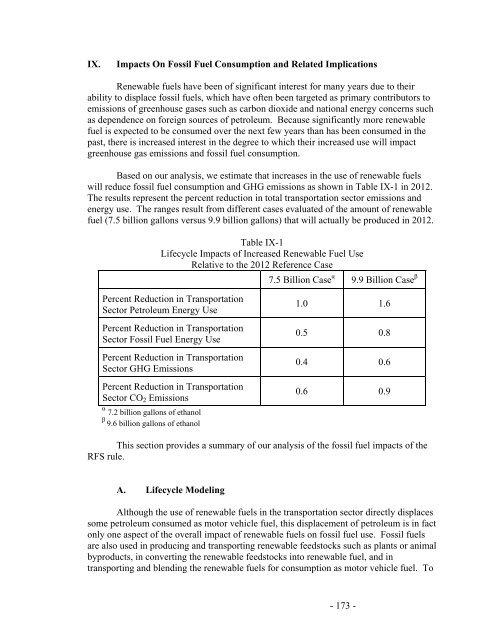Regulation of Fuels and Fuel Additives: Renewable Fuel Standard ...
Regulation of Fuels and Fuel Additives: Renewable Fuel Standard ...
Regulation of Fuels and Fuel Additives: Renewable Fuel Standard ...
Create successful ePaper yourself
Turn your PDF publications into a flip-book with our unique Google optimized e-Paper software.
IX. Impacts On Fossil <strong>Fuel</strong> Consumption <strong>and</strong> Related Implications<br />
<strong>Renewable</strong> fuels have been <strong>of</strong> significant interest for many years due to their<br />
ability to displace fossil fuels, which have <strong>of</strong>ten been targeted as primary contributors to<br />
emissions <strong>of</strong> greenhouse gases such as carbon dioxide <strong>and</strong> national energy concerns such<br />
as dependence on foreign sources <strong>of</strong> petroleum. Because significantly more renewable<br />
fuel is expected to be consumed over the next few years than has been consumed in the<br />
past, there is increased interest in the degree to which their increased use will impact<br />
greenhouse gas emissions <strong>and</strong> fossil fuel consumption.<br />
Based on our analysis, we estimate that increases in the use <strong>of</strong> renewable fuels<br />
will reduce fossil fuel consumption <strong>and</strong> GHG emissions as shown in Table IX-1 in 2012.<br />
The results represent the percent reduction in total transportation sector emissions <strong>and</strong><br />
energy use. The ranges result from different cases evaluated <strong>of</strong> the amount <strong>of</strong> renewable<br />
fuel (7.5 billion gallons versus 9.9 billion gallons) that will actually be produced in 2012.<br />
Table IX-1<br />
Lifecycle Impacts <strong>of</strong> Increased <strong>Renewable</strong> <strong>Fuel</strong> Use<br />
Relative to the 2012 Reference Case<br />
7.5 Billion Case α<br />
9.9 Billion Case β<br />
Percent Reduction in Transportation<br />
Sector Petroleum Energy Use<br />
Percent Reduction in Transportation<br />
Sector Fossil <strong>Fuel</strong> Energy Use<br />
Percent Reduction in Transportation<br />
Sector GHG Emissions<br />
Percent Reduction in Transportation<br />
Sector CO2 Emissions<br />
α 7.2 billion gallons <strong>of</strong> ethanol<br />
β 9.6 billion gallons <strong>of</strong> ethanol<br />
1.0 1.6<br />
0.5 0.8<br />
0.4 0.6<br />
0.6 0.9<br />
This section provides a summary <strong>of</strong> our analysis <strong>of</strong> the fossil fuel impacts <strong>of</strong> the<br />
RFS rule.<br />
A. Lifecycle Modeling<br />
Although the use <strong>of</strong> renewable fuels in the transportation sector directly displaces<br />
some petroleum consumed as motor vehicle fuel, this displacement <strong>of</strong> petroleum is in fact<br />
only one aspect <strong>of</strong> the overall impact <strong>of</strong> renewable fuels on fossil fuel use. Fossil fuels<br />
are also used in producing <strong>and</strong> transporting renewable feedstocks such as plants or animal<br />
byproducts, in converting the renewable feedstocks into renewable fuel, <strong>and</strong> in<br />
transporting <strong>and</strong> blending the renewable fuels for consumption as motor vehicle fuel. To<br />
- 173 -
















